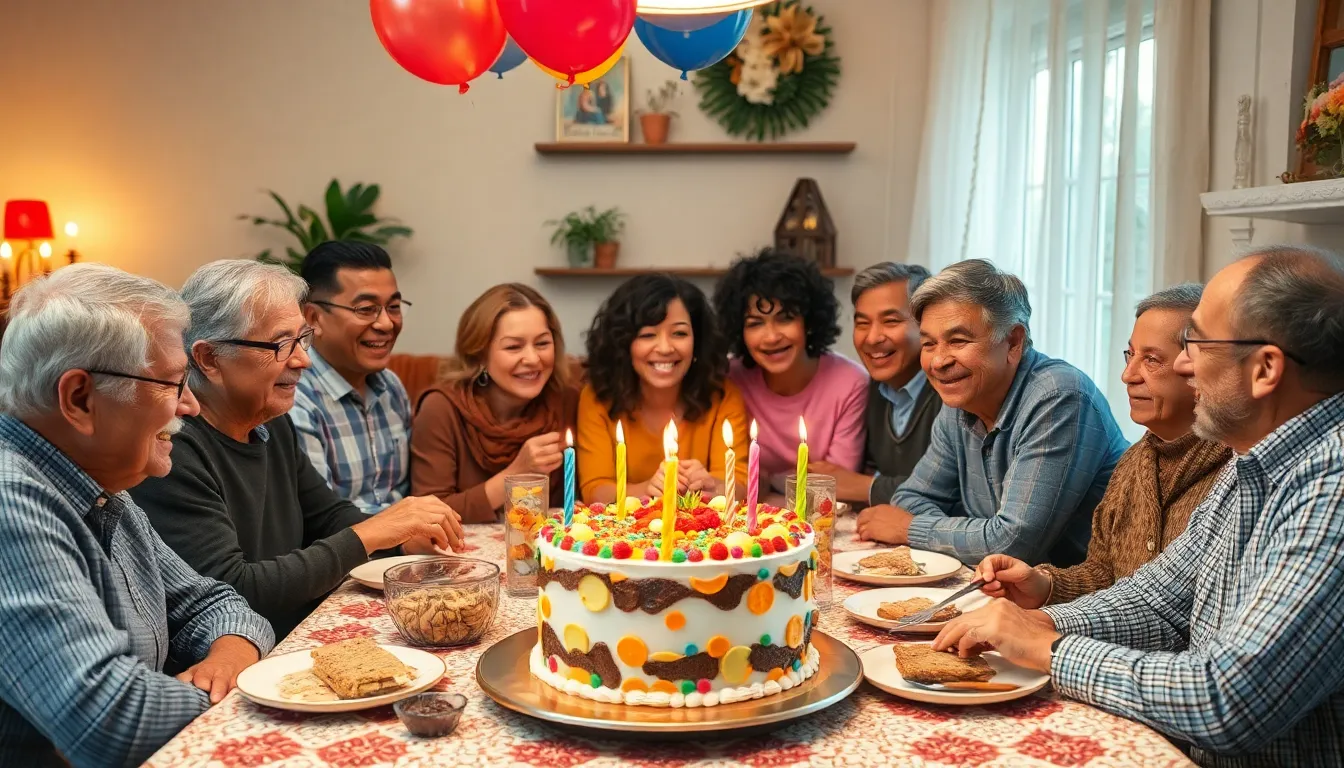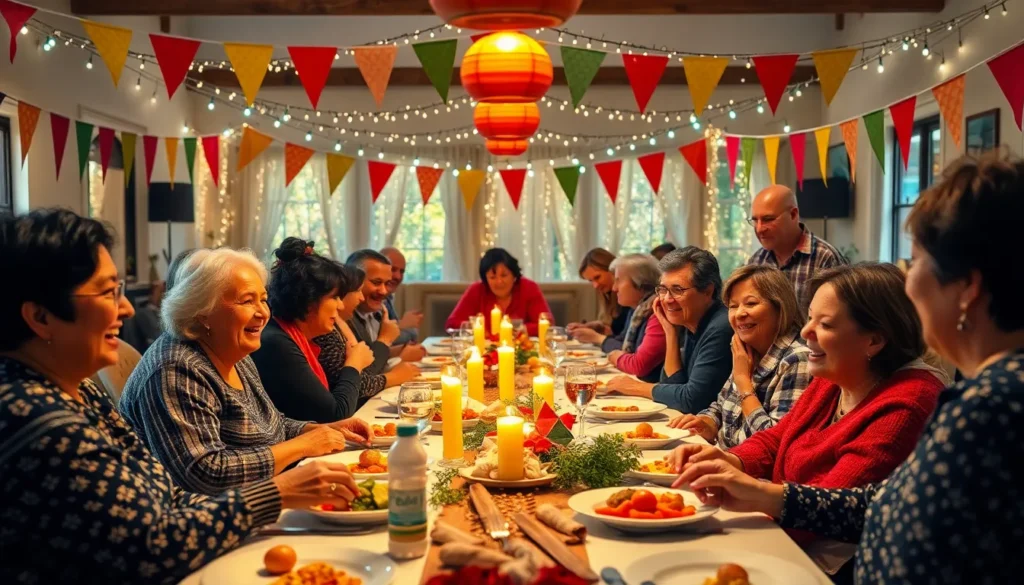Every culture has its quirks, and occasion-based traditions are the cherry on top of the cake of life. From quirky family rituals to grand celebrations, these traditions add flavor and fun to our lives. They’re the glue that binds families and friends together, turning ordinary moments into unforgettable memories.
Table of Contents
ToggleOverview of Occasion-Based Traditions
Occasion-based traditions manifest in diverse forms across cultures. These rituals enhance life by creating shared experiences that reinforce community ties. Every event, whether a holiday or a personal celebration, presents an opportunity for families and friends to come together.
Celebrations often include specific practices, such as unique meals, songs, or dances. These elements contribute to the significance of events like birthdays, weddings, and holidays, creating lasting memories. Many traditions involve storytelling, where families pass down tales that reflect their values and history.
Certain cultural rituals stand out due to their distinctiveness. For instance, in Mexico, the Day of the Dead honors deceased loved ones with colorful altars and festive gatherings. Similarly, the Japanese practice of Hanami involves viewing cherry blossoms, connecting nature with family enjoyment.
Some traditions revolve around food, emphasizing communal preparation and sharing. In Italy, Sunday family dinners feature pasta and meat dishes, fostering connection and bonding. Rituals can also include gift exchanges, like during Christmas, promoting generosity and kindness.
Not every tradition follows the same format. Quirky family practices often emerge spontaneously, adding a unique flavor to events. Engaging in such customs enhances the emotional connection among participants, moving beyond mere celebration to build a sense of belonging.
Each occasion-based tradition, whether grand or subtle, plays a vital role in shaping identities and communities. Familiarity with these customs enriches understanding and appreciation of different cultures, reminding everyone of the beauty of shared experiences.
Types of Occasion-Based Traditions

Occasion-based traditions encompass various unique practices that enrich family and cultural experiences. They can be categorized into three main types: family celebrations, cultural events, and religious observances.
Family Celebrations
Family celebrations often center around milestones like birthdays, anniversaries, and reunions. Special meals, games, and storytelling frequently accompany these gatherings. For example, traditional birthday cakes or family heirloom recipes often feature prominently during such events. Gathering together strengthens familial bonds and creates lasting memories in an environment filled with love and joy. These celebrations encourage families to uphold unique customs that reflect their heritage.
Cultural Events
Cultural events showcase the vibrancy of traditions across different communities. Festivals like Mardi Gras or Holi bring people together to celebrate shared heritage through food, music, and dance. Traditional attire and decorations enhance the festive atmosphere, allowing participants to connect with cultural roots. These occasions foster solidarity and appreciation among community members. Shared rituals during cultural events also serve to educate younger generations about their identities.
Religious Observances
Religious observances play a vital role in various faiths, marking important theological events and rituals. Celebrations such as Christmas, Ramadan, and Diwali involve unique customs, prayers, and communal feasts. These traditions offer spiritual reflection and foster a sense of belonging among adherents. Observances often involve gatherings in places of worship or homes, reinforcing community bonds. Events can include activities like lighting candles or exchanging gifts, further enriching the experience.
Importance of Occasion-Based Traditions
Occasion-based traditions play a significant role in enhancing the quality of life and enriching cultural experiences. These customs provide meaning and create memorable shared moments among individuals.
Strengthening Community Bonds
Occasion-based traditions foster community bonds through shared celebrations. Larger gatherings, such as holidays or local festivities, offer opportunities for neighbors to come together. Families participate in these occasions, strengthening ties through collective experiences. Events like community potlucks and parades create a sense of belonging. Relationships deepen when individuals engage in rituals that emphasize cooperation and mutual support. Over time, these traditions build trust and unity among community members.
Preserving Heritage and Culture
Preservation of heritage and culture is a vital aspect of occasion-based traditions. Unique customs and rituals anchor families to their roots. Celebrating significant cultural events helps transmit stories and values to younger generations. Practices such as traditional crafts, songs, and dances reflect the history and identity of a culture. These traditions help foster pride, ensuring that rich cultural legacies endure. When communities uphold their traditions, they maintain a tangible connection to their ancestry, promoting a cohesive cultural identity.
Examples of Occasion-Based Traditions
Various cultures celebrate pivotal moments through distinctive traditions, enhancing connections among individuals. Celebrations span from weddings to birthdays and holidays, each infused with unique customs and rituals.
Weddings
Weddings symbolize the union of two individuals and often involve elaborate ceremonies steeped in tradition. In many cultures, exchanging vows takes center stage, embodying love and commitment. Families often gather to partake in unique practices, such as the use of specific garments or symbolic rituals. For example, Indian weddings showcase vibrant attire and the ceremonial ‘saat phere’ or seven rounds around a sacred fire, highlighting cultural significance. Culinary choices also enrich the celebration; guests usually enjoy traditional meals reflecting regional flavors and family recipes. These customs not only foster unity but also create lasting memories for couples and their loved ones.
Birthdays
Birthdays celebrate individual milestones and highlight personal growth. These occasions often feature the singing of special songs, such as “Happy Birthday,” accompanied by cake-cutting rituals. In many cultures, guests gather to honor the birthday individual, often bringing gifts and sharing heartfelt wishes. Various traditions exist, such as the Quinceañera, marking a girl’s transition into womanhood in Latin American cultures. Celebratory activities often include games, story-sharing, and communal meals that reflect family heritage. Each birthday tradition reinforces personal connections, making every celebration unique and memorable.
Holidays
Holidays anchor people to cultural heritage and community values, fostering collective joy. Various holidays, like Thanksgiving and Christmas, are marked by specific customs that encourage gathering and gratitude. Festive meals take center stage, featuring traditional dishes that connect attendees to their ancestry. Cultural events like Diwali bring families together to celebrate light and the triumph of good over evil. Rituals involving decorations and music elevate the spirit of the occasion, often creating a sense of belonging. Diverse practices across communities highlight the rich tapestry of traditions, reinforcing shared identities while inviting new members to participate.
Occasion-based traditions are more than just rituals; they’re the threads that weave families and communities together. By participating in these unique practices, individuals create lasting memories that enrich their lives and strengthen their bonds. Whether through family celebrations or cultural events, these traditions foster a sense of belonging and identity.
As people gather to honor their heritage and share experiences, they not only preserve their culture but also pass down values and stories to future generations. The joy and connection found in these occasions highlight the importance of maintaining these cherished customs, ensuring that they continue to thrive in an ever-changing world. Embracing these traditions allows everyone to celebrate life’s moments, big or small, and appreciate the diverse tapestry of human experience.

